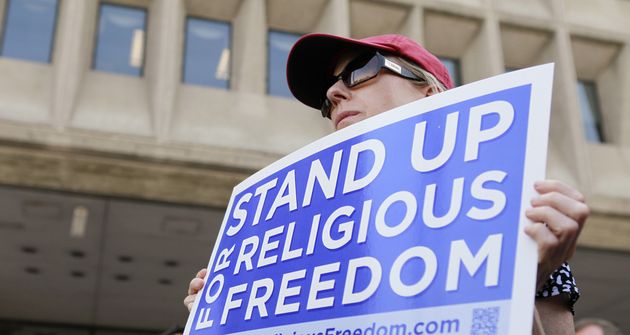‘My understanding of freedom should not put boundaries to the religious freedom of others’
“It is very important to communicate with those we are going to defend, otherwise, we can hurt them, or put them in jeopardy”, says Hans Gravaas of the Stefanus Alliance International.
FOCL · WISLA (POLAND) · 19 SEPTEMBER 2017 · 11:08 CET

Two-thirds of the world’s population is experiencing limitations on religious freedom. How does the global struggle for human rights play a role in the spreading of the gospel?
Securing the right of others does not exclude, but rather presupposes, the right of exercising one’s own rights.
But, how do we find the right balance between our own rights and the rights of others? What is the contribution of the Christian church and Christians in society with regard to this challenge? How is this challenge related to global evangelism?

In an interview with the European Leadership Forum in Wisla (Poland), Gravaas explains the connection between religious freedom and missions, and why and how should believers advocate for other Christians and non-Christians’ religious freedom.
RELIGIOUS FREEDOM AND MISSION
Hans Gravaas believes that “we have many arguments for defending and working for religious freedom for all.”
“There are theological arguments as well as arguments from the UN Declaration, article 18, on religious freedom”, he explains.
According to Gravaas, “mission is a part of Christian faith to express our faith to others in the public sphere, therefore, our human rights also lead to express our faith.”
“Mission is evangelism and proclaiming good news through both words and actions”,he adds.
However, “this freedom does not necessarily include Christians only, but all human beings who want to proclaim their faith as well”, he says.
“PERSECUTION IS A PART OF BEING CHRISTIAN”
The General Secretary of the Stefanus Alliance International points out that “according to Pew Research statistics, 76% of the world population experience restrictions in their religious beliefs in one way or another.”
Additionally, “other statistics say that, among those who suffer persecution today, 90% are Christians.”
“That’s a part of Christian faith, of being a disciple, but when normal restrictions develop into disinformation, people telling wrong stories about us that put us in a bad position, the next step will be discrimination”, he warns.
Then, “we do not have the same rights as others, less privileges. It is a faith-based restriction,and when you move onward,you might face harassment, torture, and in the worse case, imprisonment, or even martyrdom for the sake of your faith.”
“WISDOM AND DISCERNMENT”
When we are going to defend the religious freedoms of other Christians, “we need to know where we find ourselves: are we cultural insiders or cultural outsiders?”
“It is very important to communicate with those we are going to defend, because they know in what way they can be defended, otherwise, we can hurt them, or put them in jeopardy”, Gravaas says.
That is why ”we need wisdom and discernment. We have to develop a strategy with local Christians.”
In Gravaas’ human rights organisation, “we face this everyday, in terms of information: as journalits and outsiders, we would like to tell the stories and be a voice for the voiceless, that is our goal and mission. But, at the same time, we have to reflect on whether those stories have to be told”, he explains.
“And in some cases, our telling of stories might make their situation worse, so we have to talk with our local partners how to deal with it.”
“BOUNDARIES IN RELIGIOUS FREEDOM SHOULD BE WIDE”
“As Christians we defend what we believe s the truth, our goal is to proclaim the truth to everybody, but at the same time, God has given us the right to choose Him or not to choose Him”, Gravaas points out.
He recalls the “story of the rich young man in the Bible, when he left Jesus; and the interesting thing is that Jesus did not run after him.”
“To believe and what to believe is a very personal issue, defending the right of others, does not necessarily mean that we are sharing what they think is true, but we are giving them the right to believe in what they think is right.”
According to Gravaas, “if we are defending our own rights, we also have to defend the rights of others.”
“Religious freedom is very much an unlimited issue, boundaries in religious freedom should be rather wide”, he argues .
And adds: “If my understanding of freedom puts boundaries to the religious freedom of others, we are in a big problem.”
“In some Islamic countries, you have the freedom to believe, but you do not have the freedom to change your belief, they accept you with your faith, but they do not accept that their Muslim people convert to Christianity, so they are not pursuing religious freedom”, he concludes.
You can see a full talk by Hans Gravaas about this topic here.
ABOUT HANS GRAVAAS
Hans Gravaas has a PhD in intercultural studies from Trinity International University, and master’s degree in theology from Norwegian School of Theology.
He has served as a missionary within the Ethiopian Evangelical Church Mekane Yesus in Ethiopia, pastor of a Norwegian congregation in Chicago, mission secretary of the Norwegian Lutheran Mission, and president of two different university colleges in Norway.
Published in: Evangelical Focus - life & tech - ‘My understanding of freedom should not put boundaries to the religious freedom of others’
